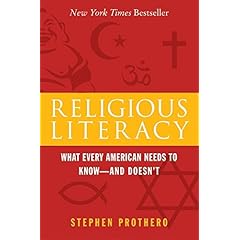
Read "Blind Faith: Americans believe in religion -- but know little about it" by Susan Jacoby, The Washington Post, Sunday, March 4, 2007.
The article is a review of RELIGIOUS LITERACY: What Every American Needs to Know -- and Doesn't by Stephen Prothero.
Fewer than half of the people in the United States "can identify Genesis as the first book of the Bible, and only one third know that Jesus delivered the Sermon on the Mount......The condition Prothero describes in Religious Literacy is unquestionably one manifestation of a more general decline in the public's cultural and civic knowledge. According to polls conducted by the National Constitution Center, only one third of Americans can name even one of the rights guaranteed by the First Amendment.....Approximately 75 percent of adults, according to polls cited by Prothero, mistakenly believe the Bible teaches that "God helps those who help themselves." More than 10 percent think that Noah's wife was Joan of Arc. Only half can name even one of the four Gospels, and -- a finding that will surprise many -- evangelical Christians are only slightly more knowledgeable than their non-evangelical counterparts......It is less surprising but more dangerous, given America's role in the world, that the public knows even less about Islam, Buddhism, Confucianism and Hinduism than it does about Christianity and Judaism.....
"Yet 19th-century autodidacts, including Abraham Lincoln (who had less than a year of formal education) and Robert Green Ingersoll, the orator known as "the Great Agnostic," achieved both religious and secular literacy by reading Shakespeare and the King James Bible without any prompting from teachers."
Comment: I have wondered about the difference between schooling and education. It seems that for many in the past, there existed a culture which encouraged thought about serious issues and philosophic principles, even in the absence of formal schooling. Today we have a plethora of formal schooling, and an absence of serious thought.
If Americans don't know about religion, there is great room for bigots and Elmer Gantry's to have undue influence. JAD
The author also notes:
The fervor of America's periodic cycles of revivalism, rooted in a personal relationship with God rather than in theology handed down by learned clergy, has always had a strong anti-intellectual as well as spiritual component.Comment: We now have unparalleled access to the thinking of wise men. We have books dating back to thousands of years ago, and huge numbers have been published in the last century. We can buy those books cheaply, or read them free from the library or online, and have all sorts of tools to sort those which have been well regarded from those which have not. It is not only in religion that good sense suggests we learn from those who have thought most seriously in the past and left us with the fruit of their thinking. The anti-intellectualism of American culture, which ignores this opportunity and responsibility is breathtaking! JAD
No comments:
Post a Comment